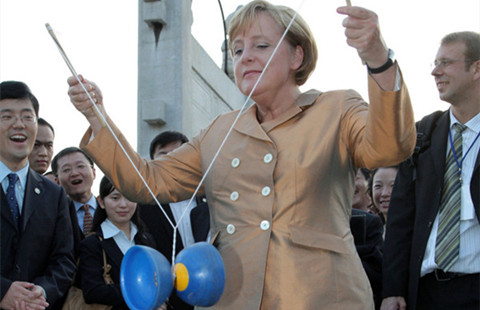Mexican author reads to kids in Beijing
( chinadaily.com.cn ) Updated: 2016-08-26 16:25:36Award-winning Mexican author had a young audience giggling recently in Beijing as she told a story about a flying beetle that buried itself in the towering hairdo of a woman just before she attended a wedding.
Mansour, who writes children's literature, read her story, El Peinado de la Tia Chofi (Aunt Chofi's Hairdo) at the Beijing Cervantes Institute on Aug 24 during the Beijing International Book Fair.
They marveled at Mansour's imagination while laughing along with the twisted plot, in which the vain aunt is forced to attend the wedding with the bug still in her hair because it couldn't be extracted without destroying her hairstyle.
Many of Mansour's inspirations came from actual life, she says.
"When I see something, or a scene, in daily life, they are like seeds planted in my head. With imagination, seeds grow up and become stories." Mansour says the story of the bug came from a childhood experience when her mother screamed after finding a bug on her hairdo.
Mansour's lively imagination and vivid writing earned her the Children and Youth Literature Award and the Edge of the Wind Award in Mexico.
She says children's literatures can be a bridge to encourage Sino-Mexican cultural connections. "China and Mexico are open to the whole world now. So it's a great chance for cultural exchange," she says. "A real good story can benefit children as well as adults."
Although her books have not been translated into Chinese yet, she still believes children could learn from her stories. "The more children can experience from outside their world, the wider their horizon will be, the more tolerant they will become in the future.
"Children have many things in common no matter where they come from. They are sensitive to beauty, love and color. So they will have resonance from my stories," Mansour says.
With a total of more than 570 million speakers, Spanish is one of the most widely used languages in the world. In China, more than 30 universities have Spanish majors, encompassing 25,000 students.
However, the translation of Spanish-language literature did not start until Don Quixote, first novel translated directly from Spanish, came out in 1995. Despite the interest in China, the amount of translated Spanish-language literature is still limited due to the lack of translators.
To promote Mexican and Spanish literature, the Beijing Cervantes Institute, together with the Mexican embassy in China and the Center of Foreign Studies at National Autonomous University of Mexico hosted the event during the book fair. The sponsors hope it will encourage more people, especially the young, to know and learn Spanish.
Cervantes Institute also has exhibitions, concerts, workshops, forums, movies, and sometimes cultural events free to the public to promote the Spanish language and culture. In 2015, the Cervantes Institute invited Chinese writer Liu Zhenyun and Spanish writer Enrique Vila to have a dialog on the relationship between literature and the city.
The Cervantes Institute is a nonprofit arm of Spain's government that promotes Spanish culture around the world. It is named after Miguel de Cervantes, author of Don Quixote.
|
|
|
|
|
|
|
|
Features
 Merkel's lighthearted moments in China
Merkel's lighthearted moments in China  British pub becomes tourist attraction after Xi's visit
British pub becomes tourist attraction after Xi's visit
European Weekly
 We will not give up search, Li vows
We will not give up search, Li vows
International hunt for missing airliner continues after fruitless six-day search




















